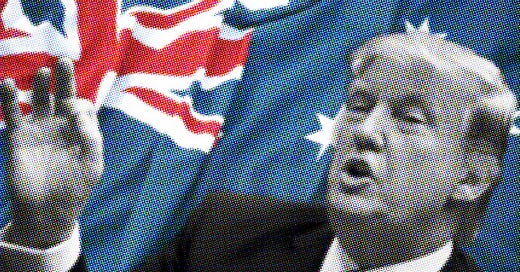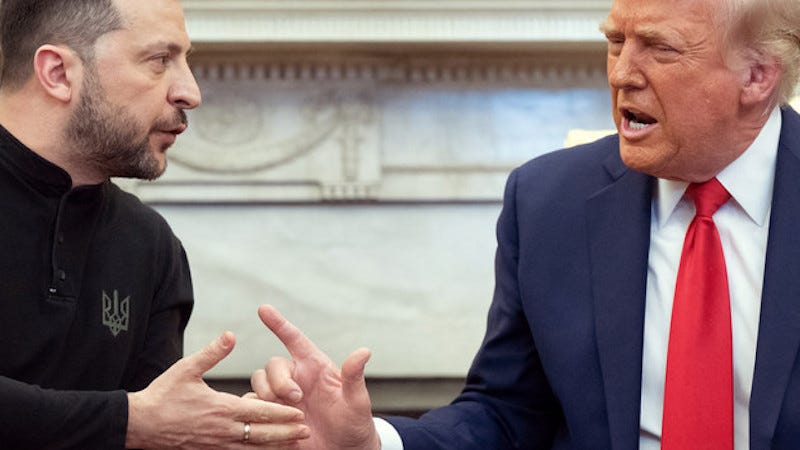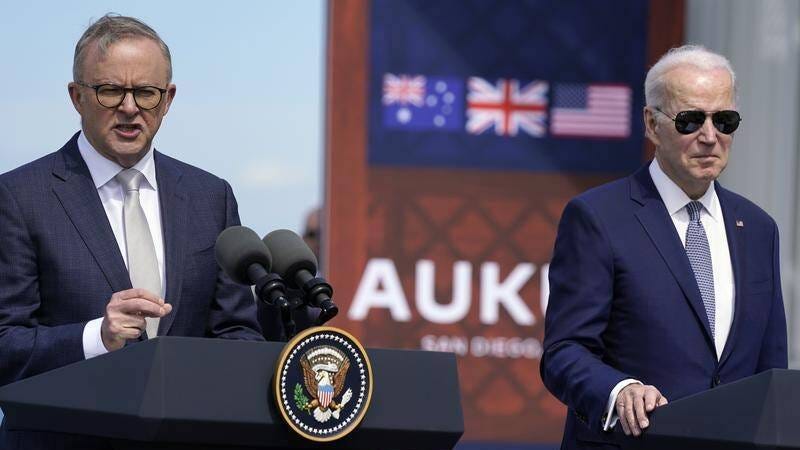Australia needs to shift away from Trump’s unstable America
A more balanced approach to Australia’s regional relationships could offer greater long-term stability.
The United States, once considered a beacon of international diplomacy and domestic stability – for many people, but not all – is now demonstrating inconsistencies and alarmingly unpredictable behaviour that is becoming unsettling for both its closest allies and the global community at large. Australia’s changing perceptions of the AUKUS agreement serves as an example of how Washington’s shifting allegiances and perplexing policy decisions are eroding international confidence.
The recent decision by the United States to vote with 17 other countries against a United Nations resolution calling for a comprehensive, just, and lasting peace in Ukraine has stunned many observers, especially in light of the global support Ukraine has received over the past three years. Suddenly, the United States has aligned itself with a small group of nations characterised by authoritarianism, extremist right-wing behaviour, or other forms of political repression, including apartheid (Israel) and this kind of alignment is a departure from the traditional U.S. positioning, where partnering with or being backed by these kinds of regimes would have been unthinkable. Certainly, the Ukraine–Russia war is complex, based on many historical, economic and political factors, but the swift change by the U.S. has surprised many observers.
Even more troubling is the effort by the United States to negotiate access to rare minerals in Ukrainian territories currently under Russian control while simultaneously trying to court the Ukrainian government for a deal of its own which, based on the events over the weekend in the Oval Office where Donald Trump and Senator J.D. Vance did their best to publicly humiliate Ukrainian President Volodymyr Zelenskyy, is now unlikely to happen.
Far from maintaining a predictable framework of foreign relations, the United States now exhibits the hallmarks of an aggressive fascist state. As these trends accelerate, the ramifications for allied nations like Australia are becoming apparent: the bonds once grounded in shared values and mutual respect may be unravelling under the weight of an unpredictable Washington.
This unpredictability is further magnified by the precarious nature of the current U.S. administration. Past administrations – however flawed – at least possessed a certain degree of organisation and expertise capable of limiting the potential damage of rash decisions. The Trump Mark II government lacks sufficient depth in foreign policy knowledge and remains prone to confusing shifts in direction. The dismissal of seasoned advisors, replaced by those short on both practical experience and coherent vision but an unquestioning loyalty to Trump, has produced an environment in which critical decisions are made impulsively, often contingent on the president’s audience at any given moment. This type of governance causes allies to question the reliability of American commitments, fuelling concerns that high-stakes international agreements can be undermined by domestic U.S. political pressure or simply cast aside on a whim.
Now, with a government stacked with conspiracy theorists, untested media figures, and individuals seemingly motivated by ever-shifting impulses – even a podcaster – the United States appears unable to sustain even the veneer of coherent policy. This chaos magnifies risks for allies who rely on American leadership and consistency and there is now a genuine alarm over how easily joint ventures can dissolve, how fast treaties might be discarded, and how arbitrarily the United States might upend previously secure alliances. For a nation such as Australia, caught in the crosscurrents of international power politics, the situation poses difficult dilemmas about whether continued strategic dependence on Washington remains sensible or even viable in the long run.
A looming question for Australia, and for much of the world, is whether the United States has entered a new stage of internal decline coupled with external belligerence – an inward fracturing coinciding with erratic expansions of power. Allies must decide if they can still consider themselves part of a principled alliance where values and strategy align, or if it is time to re-evaluate the alliance altogether. The uncertainty and instability coming from Washington has the potential to shake the foundations of existing geopolitical structures, and the urgency to reassess engagements and treaties has become more urgent.
Australia’s dilemma in a world of shaken confidence
Australia’s concerns over whether the United States would genuinely honour its defence commitments in the event of an invasion have resurfaced with renewed intensity. Prime Minister Anthony Albanese’s recent assertion that Australia must maintain self-reliance despite the ANZUS security pact illustrates a deepening unease, a realisation that treaty obligations on paper do not necessarily translate into consistent, reliable assistance on the ground. Fortunately, these obligations have never been tested but how certain could Australia be that the United States would offer support in the unlikely event of an invasion?
The Prime Minister has emphasised the critical importance of national sovereignty and pointed out that while the United States is a valued ally, Australia must remain prepared to protect its own interests. Skepticism about Washington’s support is understandable; after all, American actions have previously exposed the fragility of “rock-solid” accords. The free trade agreement between the two nations did not stop the U.S. from imposing tariffs on Australian steel and aluminium – an unsettling precedent that raises questions about how other alliances might be disregarded should geopolitical pressures suddenly shift.
Amid these anxieties over security, global power dynamics are evolving at a rapid pace. The continuing conflict between Russia and Ukraine, already marred by territorial disputes, historical grievances, and illegal invasions, has become a contest of competing narratives. Where once Russia was deemed the sole aggressor, figures like Trump now openly accuse Zelenskyy of dictatorship, blaming him for a war that was long framed as Russia’s doing. One moment, Zelenskyy was depicted as a heroic defender of national sovereignty; the next, he is subjected to the public humiliation – in one instance, for not wearing a suit – in the Oval Office by Trump and Senator Vance. The head-turning of these contradictory messages is now symbolic of how American discourse can change abruptly, leaving allies and observers alike to wonder which version of events aligns with underlying reality – or if any of it does at all.
The broader significance of the U.S. adopting volatile stances extends beyond Ukraine. Washington’s purported willingness to forge backdoor resource deals in Russian-occupied Ukrainian territory has sown fresh discord in diplomatic circles. Such behaviour, coupled with strident denunciations of long-standing partners one day and conciliatory overtures the next, has contributed to a sense that the United States is not only an active destabiliser but one embracing tendencies historically associated with fascist regimes.
What was once a superpower that championed a particular vision of democracy and international norms seems increasingly driven by inward-facing populism and fractious domestic agendas. This unpredictability – and unhinged inconsistency – shifts the terrain for countries dependent on the U.S. security umbrella, especially Australia, which must now consider whether an America inclined toward fluid realignment can truly be relied upon in a moment of existential crisis.
The spectre of U.S. unreliability plays neatly into the strategic ambitions of adversaries. Figures such as the President of Russia, Vladimir Putin, a former Cold War operative with a long-standing aspiration to erode American influence, must be relishing this chaos. Whether fuelled by Russian interference in U.S. elections, social media misinformation campaigns, or larger machinations behind the scenes, an America consumed by domestic upheaval provides great opportunities for historical geopolitical rivals to advance their own interests. Australian policymakers, looking on from afar, can’t afford to ignore these shifts or cling to outdated assumptions rooted in pre-2001 mindsets. The cascading consequences of the 9/11 era still reverberate nearly a quarter-century later, yet today’s global environment also presents a distinctly new breed of instability – one that merges Cold War tensions with modern propaganda tools, with the United States both shaped by and shaping the chaos.
Each of these factors converges on the unnerving possibility that if real conflict ever erupted on Australia’s shores, the U.S. response might be decided not by any enduring sense of alliance or moral obligation but by the political turbulence of the moment – and inherent American self-interest. Nations that once could bank on American leadership face a predicament: join the chaos, resist it, or distance themselves altogether. Australia, given its long history of alignment with Washington, may soon be forced to make a choice that was almost unimaginable even just a few months ago, as global fault lines shift and alliances that once seemed monolithic suddenly look far more transient.
Why cancelling AUKUS could secure Australia’s future
Australia’s alliance with the United States, once seen as unbreakable, faces a moment of reckoning. The AUKUS deal was signed in 2021 as a monumental security arrangement promising to transform Australia’s naval capabilities and fortify its strategic posture in an unpredictable global landscape. Yet the deal’s lack of transparency and the speed at which it was concluded have left the Australian public and many experts questioning whether the project truly serves the national interest. The precedent set by scrapping the French submarine contract – as a result of the AUKUS agreement and resulting in a multi-billion-dollar payout for which Australia received little benefit – shows that foreign-policy decisions can be reversed when they no longer align with core objectives. Daring to reconsider the AUKUS agreement, especially given the unprecedented turbulence coming out of Washington, might be the more prudent path.
Australia should rely more on relationships with nations in its own neighbourhood, ensuring stronger diplomatic ties with regional partners such as Indonesia (and China) while exploring collaborative ventures with countries less entangled in the domestic chaos now gripping the United States. That chaos has raised troubling questions about Washington’s ability to deliver on its security obligations: tariffs have demonstrated how swiftly a partnership can be undermined when the U.S. shifts its policy priorities and concerns about the American political climate drifting toward fascist and authoritarian tendencies only magnify the urgency of looking elsewhere for reliable partnerships.
Leaving the AUKUS agreement would neither be easy nor cost-free, but Australia’s economic and security frameworks might benefit more from cultivating a pragmatic distance from its traditional ally – at least until the U.S. regains a semblance of stability. The key lies in governments engaging with the electorate honestly: a government bold enough to reconsider AUKUS could present a compelling case that stepping away from an increasingly erratic partner is not an abandonment of security but a redefinition of it.
By reshaping foreign policy, Australia might not just avoid entanglement in conflicts it never sought; it may also discover that a more balanced approach to its regional relationships offers greater long-term stability.











